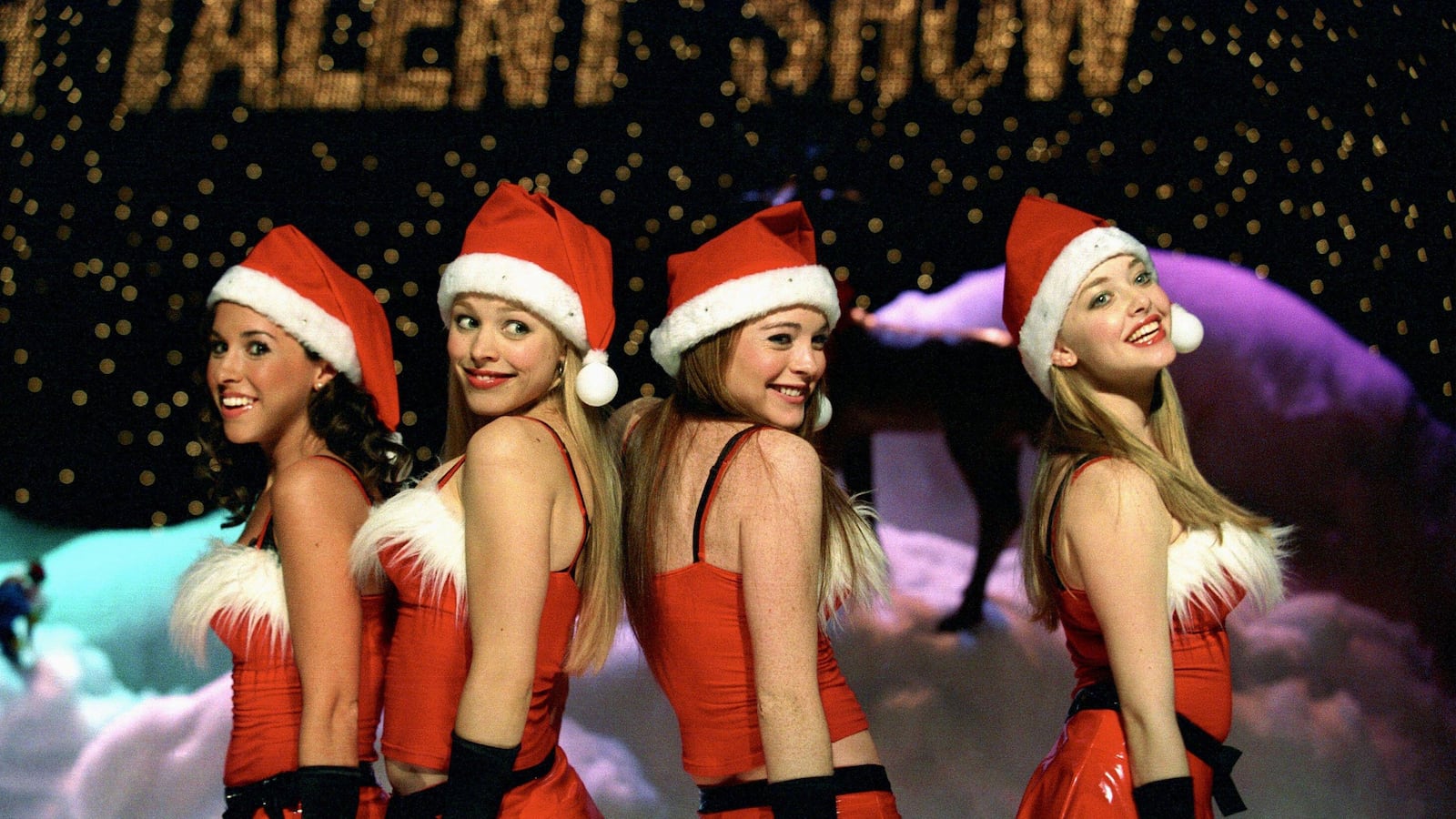From the moment Mean Girls first strutted into theaters in 2004, middle and high schoolers everywhere were hooked. Quotes like “on Wednesdays, we wear pink” and “Gretchen, stop trying to make fetch happen!” bounced around school hallways. On Oct. 3, someone might turn around from their desk to deadpan, “It’s October 3,” and on Halloween, at least one girl would inevitably drop an “I’m a mouse—duh!” High school calculus classes became Ground Zero for “the limit does not exist!” jokes, and of course, “Boo, you whore!” became a go-to insult.
The adult world might have been insulated enough to avoid such cultural saturation, but Girl World was obsessed, partially because so few teen comedies had catered specifically to that audience; movies like Clueless, Legally Blonde, and Bring It On only occasionally floated in like little bedazzled life rafts on a sea of John Hughes movies and American Pies. With its A-list pedigree, snappy writing, and keen eye for cultural trends, Mean Girls was bound to go gangbusters, validating once more the power that women and girls hold in the mass market. (Hi, Barbie!) But no matter how many times we try to recapture the magic, it’s also time to accept a sad truth: We’ll probably never get another teen comedy this big again.
Back in 2004, Mean Girls had it all. Lindsay Lohan, who starred as Cady Heron, was at the height of her fame, and Regina George herself, Rachel McAdams, had locked down two blockbusters in the same year—Mean Girls and The Notebook. Lohan and McAdams, along with Amanda Seyfried and Lacey Chabert, completely understood the assignment, delivering their lines with a deliciously tart conviction, and even ancillary players like Rajiv Surendra (who played Kevin G) carved out their time to shine. Meanwhile, writer Tina Fey (who also starred as Ms. Norbury) was seven years into her Saturday Night Live tenure and had already spent four of them behind the “Weekend Update” desk. If that wasn’t enough to get parents on board, Fey’s fellow SNL stars Amy Poehler, Ana Gasteyer, and Tim Meadows also starred.
More important than any cast member, however, was the writing—a one hour and 37-minute marathon of nonsensical, endlessly quotable jokes that seemed specifically designed for early-internet meme-ability, before that was even a thing. The film’s production was also key. From Regina George’s multicolor Takashi Murakami x Louis Vuitton purse to the perfectly blended soundtrack— which stirred together new hits like Kelis’ “Milkshake” with classics from artists like Blondie—Mean Girls had its French manicured finger on a very specific pulse, which only deepened its resonance.
After Mean Girls, a couple of teen comedies like Superbad and Juno (both released in 2007) managed to recapture the zeitgeist. Look much later than that, however, and you’ll struggle to find a teen comedy that hit that hard ever again.
Why is it that movies like The Duff, Edge of Seventeen, Booksmart, and Do Revenge never seem to break through in the same way? One could argue that they’re just not as strong (some of them definitely aren’t) but something deeper also seems to be at play: Trends in how we make, consume, and talk about media have shifted in ways that make a teen comedy like Mean Girls almost impossible to replicate.
Superhero movies like Iron Man might’ve portended the collapse of original filmmaking for adults, but that same year, teen cinema got its equivalent in the first Twilight movie. The Harry Potter series had already signaled the power of franchises had to capture young people and their parents at the box office, and Twilight further confirmed that trend. When Harry Potter split its final installment in two, Twilight followed suit—and then, so did its inheritor, The Hunger Games, which premiered in 2012.
While studios began to concentrate their attention (and budgets) around major tentpoles, other forces began to take shape online. Myspace launched in 2003, and a year later, the same year that Mean Girls premiered, came Facebook—a social network for college students that opened its doors to the public two years later. Teens had already been spending more and more time online, on sites like Xanga and LiveJournal, but Myspace and especially Facebook took things to a new level, as did Twitter a few years later. The more time we’ve all spent on social media, the more pop culture—once a monoculture—has splintered into increasingly atomized tastes.
These days, TikTok, Spotify, and algorithms wield far more influence over most people’s music choices than Top 20 Countdowns and radio DJs. In a world of social media influencers, niche media, and micro-celebrities, it’s increasingly rare to see anything that is not a Taylor Swift or Beyoncé tour achieve such cultural ubiquity. And so, movies like Barbie and Oppenheimer seem like minor miracles in the Year of Our Tech Overlords 2024.
When it comes to teen comedies, part of the problem might just be that there haven’t been many great ones. (Teen comedies that are actually good were, after all, few and far between even before the internet era.) And yet, even the rare entries that do manage to resonate fizzle out like flashes in an overcrowded pan. See, for example, 2022’s impeccably styled Do Revenge, starring beloved Riverdale breakout Camila Mendes and Gen-Z Cool Girl Maya Hawke. Critics loved the candy-colored Strangers on a Train riff, and by its second week on Netflix, so did viewers. But when was the last time you heard someone quoting it? Does anyone still talk about that movie at all? We’ve got more content than ever these days, but it’s become increasingly impossible to remember most of it more than a week after streaming.
One way or another, a gem or two will (hopefully) always manage to break through the content overload. But year after year, it’s looking more and more like Mean Girls might’ve been one of our last, pink gasps of teen-comedy cultural domination.






